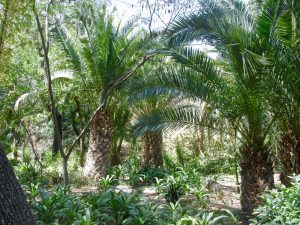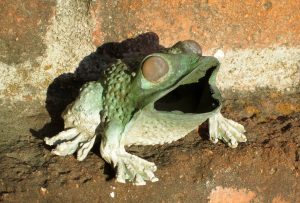In the early-early ‘70s, when the kids’ TV show “Sesame Street” was a new American creation, and I was living with my young daughter in southern Africa, my mother in New Jersey sent us the freshly minted “Sesame Street” long-playing record album in the mail – to the delight of my daughter and her little friends.
The children sat on my living room carpet in a semicircle, as if my record player were a hearth, mesmerized by the happy music so new to them (and to the world): “Sunny day, sweepin’ the clouds away — on my way to where the air is sweet! Can you tell me how to get, how to get to Sesame Street?”
Before long, because we played the record over and over and over again, the kids and I knew all of the words to every song, and we all sang along to the l.p. My personal favorite, sung by the ever-serious “straight man” Kermit the Frog, was “It’s Not Easy Bein’ Green.” Kermit’s soulful words made me realize then that in my quarter-century of living I’d never bothered to look at life from a frog’s perspective. Kermit sang:
“It’s not that easy being green
Having to spend each day the color of the leaves
When I think it could be nicer being red, or yellow or gold
Or something much more colorful like that…”
Like a lot of us, especially when we’re young, Kermit was comparing himself unfavorably to others, bemoaning the fact that he wasn’t born a more fiery color, like red or yellow or, better yet, glistening gold. He continued to moan:
“It’s not that easy being green! –
It seems you blend in with so many other ordinary things
And people tend to pass you over ’cause you’re
Not standing out like flashy sparkles in the water
Or stars in the sky…”
Mid-way, however, Kermit gets a grip. He sees the light. He has an epiphany:
“BUT — green’s the color of Spring!
And green can be cool and friendly-like
And green can be big like an ocean, or important
Like a mountain, or tall like a tree…”

I’ve been thinking lately about Kermit’s lifelong lesson to me — and the importance of “Sesame Street” to now generations of children — because the new U.S. President, real-estate-tycoon-turned-emperor-wannabe, Donald Trump, has just proposed budget cuts that appear to include threats to this award-winning, cherished educational television program.
In his New York Times op-ed this week, “President Trump vs. Big Bird,” columnist Nicholas Kristof clarifies: “In fact, Big Bird [and his fellow Muppets, such as Kermit] will survive [because “Sesame Street” has become pretty much self-supporting], but some local public television stations will close without federal support — meaning that children in some parts of the country may not be able to see ‘Sesame Street’ on their local channel.”
Still, what a loss, should that budget proposal pass. Children whose lives are already “not that easy,” because they live in poorer communities where viewers cannot afford to support their public television station, won’t have the ready benefit of Kermit’s epiphany, a lesson that teaches a healthy self-love and self-acceptance, as well as empathy for others.
Lately I’ve been singing snippets of Kermit’s hit tune in my head. “It’s not that easy being _____________” [fill in the blank]. My list, it turns out, is long, but it boils down to this universal, I think: It’s not that easy being a sensitive, sentient, humane human being in this current, crazy, tumultuous world.
The last stanza of Kermit’s song goes like this:
“When green is all there is to be
It could make you wonder why. But why wonder why?
Wonder: I am green and it’ll do fine, it’s beautiful
And I think it’s what I want to be.”

Even today, nearly a half-century since I first heard Kermit sing this song, I’m still learning from it. Among the long list of things it’s not that easy being — I’m finding first-hand — is an older person. The cliché, “growing old is not for sissies,” is perfectly apt. So, to reboot my sometimes sagging old spirit, I remove the word “green” in Kermit’s last stanza and substitute “old”:
“When old is all there is to be … why [bother to] wonder why? [Instead, face facts:] I am old, and it’ll [have to] do fine…” And I think it’s what I am now meant to be.
